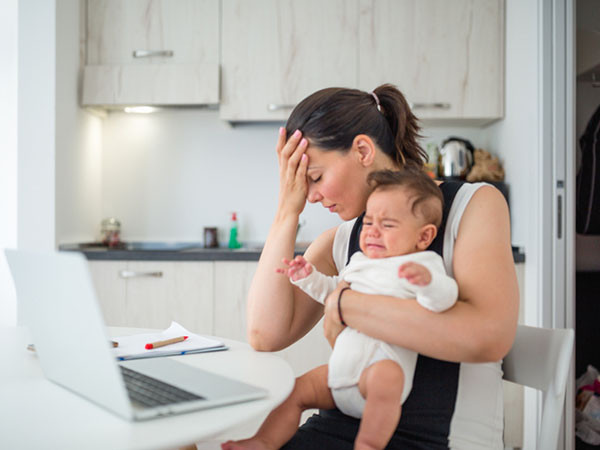Postpartum OCD Treatment
Postpartum OCD Treatment, is another common type of Obsessive-Compulsive Disorder (OCD) its a unique condition that develops after childbirth. While postpartum depression (PPD) is widely discussed, postpartum OCD remains underrecognized despite its significant impact. It involves intrusive, distressing, repetitive thoughts and compulsive behaviours focused on the newborn’s safety and well-being, disrupting daily life and bonding with the child.
This article explores postpartum OCD symptoms, types, causes, and treatments. It also shares recovery strategies and success stories from Emotion of Life under the guidance of OCD specialists Shyam Gupta and Pratibha Gupta.
What is Postpartum OCD?
Postpartum OCD treatment is characterized by intrusive thoughts (obsessions) and/or compulsive behaviours aimed at reducing anxiety. Unlike psychosis, mothers with postpartum OCD know their thoughts are irrational and experience distress because of them. This distinction is crucial in differentiating postpartum OCD from postpartum psychosis, a rarer, more severe condition.
Symptoms of Postpartum OCD
Psychological Symptoms
- Intrusive thoughts about harming the baby (dropping, smothering, etc.)
- Repetitive catastrophic mental images
- Overwhelming guilt or shame over thoughts
- Fear of being left alone with the baby
- Persistent doubt about safety tasks (e.g., checking locks, stoves, breathing)
Physiological Symptoms
- Increased heart rate, shortness of breath during intrusive thoughts
- Difficulty sleeping due to anxiety
- Muscle tension and restlessness
- Fatigue from hypervigilance
- Stress-related stomach issues
Behavioural Symptoms
- Excessive sterilizing, cleaning, or sanitizing
- Avoiding holding or bathing the baby
- Constant reassurance-seeking from family
- Rigid rituals to prevent perceived harm
Types of Postpartum OCD
- Harm OCD: Fear of unintentionally harming the baby, leading to checking and avoidance.
- Contamination OCD: Extreme fear of germs or illness affecting the baby.
- Order and Symmetry OCD: Compulsively arranging items to prevent perceived harm.
- Religious or Moral OCD: Intrusive thoughts conflicting with beliefs, causing guilt.
- Reassurance-Seeking OCD: Repeatedly asking others for validation of caregiving safety.
Causes of Postpartum OCD
Biological Factors
- Hormonal fluctuations (estrogen, progesterone)
- Stress hormone changes (cortisol)
- Genetic predisposition to OCD/anxiety
Psychological Factors
- History of anxiety/OCD or perfectionism
- Fear of mistakes as a new parent
- Heightened awareness of risks
- Distorted fear-based thinking
Environmental & Social Factors
- Lack of sleep and exhaustion
- Limited emotional support
- High stress during/after pregnancy
- Pressure from cultural/family expectations
Cognitive Strategies
- Cognitive Restructuring: Challenging irrational fears and replacing them with balanced views.
- Exposure and Response Prevention (ERP): Gradual exposure to feared thoughts without compulsions.
- Cognitive Diffusion: Distancing oneself from intrusive thoughts, recognizing them as mental events.
Behavioural Approaches for Postpartum OCD Treatment
- Mindfulness techniques for present-moment focus as Postpartum OCD Treatment
- Gradual exposure to feared caregiving tasks as Postpartum OCD Treatment
- Structured sleep and routine regulation
- Behavioural experiments to test fears safely as Postpartum OCD Treatment
Supportive Environmental Modifications:
- Delegating tasks to reduce stress
- Shared caregiving responsibilities with family
- Educating family about postpartum OCD
- Structured schedules to reduce unpredictability
Long-Term Considerations as Postpartum OCD Treatment
Managing postpartum OCD Treatment at Emotion of Life requires ongoing self-monitoring, stress reduction, and avoiding excessive self-judgment. Recognizing that intrusive thoughts do not define parenting ability is essential for long-term well-being.
Success Stories of Postpartum OCD Treatment Recovery
Hiral, Gujarat
Hiral suffered intrusive harming thoughts for 4 years and had seen multiple professionals without full recovery. After 100 days and 100 sessions at Emotion of Life with Shyam Gupta and Pratibha Gupta, she reported 98% recovery. She praised their compassionate, structured approach.
Shikha, London
Shikha struggled with postpartum OCD, chronic depression, and severe anxiety after her first childbirth. Despite 14 years of OCD history, she fully recovered in 3 months (120 sessions) under Shyam Gupta’s program. She regained confidence, overcame depression, and is thriving personally and professionally, with no relapse after 8 months.
“If my friend can recover from postpartum OCD with Emotion of Life, anyone can. Shyam Sir and Pratibha Madam know exactly what’s needed for true recovery.”
FAQs
What is Postpartum OCD?
What are the symptoms?
How does Emotion of Life treat postpartum OCD without medicine?
Is ERP safe for new mothers?
Can postpartum OCD go away on its own?
What’s the difference between postpartum depression and postpartum OCD?
How can Emotion of Life help with recovery?
Conclusion on Postpartum OCD Treatment
Postpartum OCD is a serious but treatable condition. With early recognition, CBT, ERP, and family-supported strategies, mothers can regain confidence and bond with their child. Emotion of Life’s structured daily-session program, led by Shyam Gupta and Pratibha Gupta, has shown proven success in helping new parents overcome postpartum OCD without medication.
Call: +91 9368503416
Visit: www.emotionoflife.in
write to us: info@emotionoflife.in
Book Now | Review | OCD Types | Meet Our Experts | Success Stories| Contact Us| MyPsychologist


